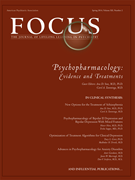From the Guest Editor: New Treatment Advances
It is fortunate that treatments for serious mental illnesses continue to accrue, providing new pharmacologic and other biological treatments to support clinical care in areas of high medical need. How to utilize these new treatments to their fullest is a critical topic for practicing physicians. The current issue of FOCUS reviews the latest biological therapies for serious mental illnesses, ones that practicing physicians may not yet have entirely synthesized; moreover, the reviews include a forecast of highly promising treatments in development for the illness. Schizophrenia, major depressive disorder, depression and mixed state in bipolar II disorder, and anxiety disorders are included. For schizophrenia, the review presents information around the three newest antipsychotics. In this review, readers will find the evidence on which their efficacy is based and practical recommendations around their differential use in clinical practice. For depression in bipolar II/mixed states of bipolar spectrum, readers will find a clinical review of treatment needs and outcome data for current treatment strategies with evidence of their differential efficacy. For the treatment of major depression, readers will find a persuasive argument for algorithm-based treatment, support for measurement-based care (MBC), and an analysis of novel antidepressant approaches, including glutamate receptor antagonist treatment and repetitive transcranial magnetic stimulation; the discussion of how these treatments can be integrated into routine practice for the treatment of major depression is valuable. Finally, this issue provides a summary of the most up-to-date biological therapies for anxiety disorders and explores novel mechanisms that could lead to the adoption of new drugs into clinical practice; the article ends with a strong call for new treatment development. This impassioned plea is important in each one of these clinical areas.



